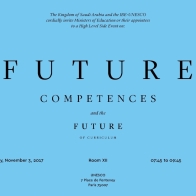
Location: UNESCO Headquarters, Paris (France)
Date: 03 November 2017
Time: 07:45 am - 09:45 am
UNESCO member states at November’s General Conference in Paris have been discussing the IBE-UNESCO’s proposals for world-wide transformation of curriculum. The proposals are designed to promote learning that will enable students to adapt and succeed in fast changing 21st century development contexts.
The IBE-UNESCO argues that achieving such learning demands the reorientation of national curricula to competence-based approaches, rather than simply the more traditional, subject-based approaches. It also requires the transformation of teaching, learning, and assessment to best support the implementation of competence-based curricula.
The High Level Side Event, entitled Future Competences and the Future of Curriculum, was led and supported by the Kingdom of Saudi Arabia in collaboration with the IBE-UNESCO.
Discussions at the side event explored the challenges of attaining and sustaining curricula relevance amid accelerating social and economic change that can easily render knowledge and skills obsolete or irrelevant. The IBE-UNESCO’s proposals seek to help member states to build education and learning systems that can prepare learners (both young and old) for a future that is complex and, to some extent, unknown. Discussions also took note of the fact that, while change is inevitable, curricula reforms need the stability required to give them a winning chance. The future of curriculum itself is therefore complex. UNESCO member states discussed how to address this complexity.
The IBE-UNESCO has proposed an institutional mechanism for sustaining relevance, which was considered by member states.
The IBE has prepared background documents to guide the future of curriculum. A summary of the documents was presented at the side event.
The documents can be found below.
Paper 1: "Reconceptualizing and Repositioning Curriculum in the 21st Century" (PDF) (Web)
Paper 2: "Future Competences and the Future of Curriculum" (PDF) (Web)
Paper 3: "Transforming Teaching, Learning and Assessment" (PDF) (Web)